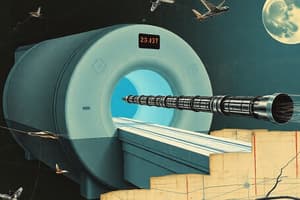Podcast
Questions and Answers
V.L. Ginzburg is a prominent scientist in the field of superconductivity
V.L. Ginzburg is a prominent scientist in the field of superconductivity
True (A)
Superconductors were once thought to be physically impossible
Superconductors were once thought to be physically impossible
True (A)
K. Onnes was awarded the Nobel Prize in 1911 for his low-temperature research on superconductivity
K. Onnes was awarded the Nobel Prize in 1911 for his low-temperature research on superconductivity
False (B)
The electrical resistivity of a mercury wire disappears suddenly when cooled below a temperature of 4 Kelvin
The electrical resistivity of a mercury wire disappears suddenly when cooled below a temperature of 4 Kelvin
Absolute zero is known to be 0 Kelvin
Absolute zero is known to be 0 Kelvin
Flashcards are hidden until you start studying
Study Notes
Superconductivity Overview
- V.L. Ginzburg is a distinguished figure in superconductivity research, contributing significantly to the field's understanding and advancements.
- Superconductors were historically regarded as a theoretical impossibility until experimental evidence emerged.
Key Historical Milestones
- K. Onnes received the Nobel Prize in 1911 for his groundbreaking work on superconductivity at low temperatures.
- Significant findings in Onnes's research included the phenomenon where the electrical resistance of mercury drops to zero when it is cooled to below 4 Kelvin.
Fundamental Concepts
- Absolute zero is defined as 0 Kelvin, a fundamental limit where molecular motion ceases, representing the lowest possible temperature.
Studying That Suits You
Use AI to generate personalized quizzes and flashcards to suit your learning preferences.



